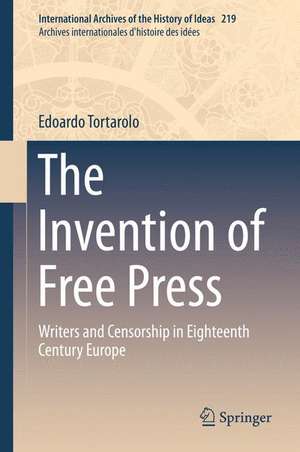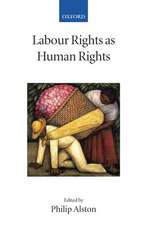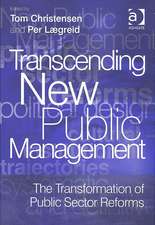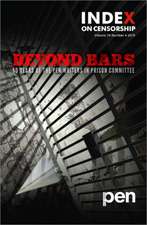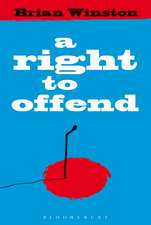The Invention of Free Press: Writers and Censorship in Eighteenth Century Europe: International Archives of the History of Ideas Archives internationales d'histoire des idées, cartea 219
Autor Edoardo Tortaroloen Limba Engleză Hardback – 17 mar 2016
| Toate formatele și edițiile | Preț | Express |
|---|---|---|
| Paperback (1) | 384.31 lei 43-57 zile | |
| SPRINGER NETHERLANDS – 25 apr 2018 | 384.31 lei 43-57 zile | |
| Hardback (1) | 391.61 lei 43-57 zile | |
| SPRINGER NETHERLANDS – 17 mar 2016 | 391.61 lei 43-57 zile |
Din seria International Archives of the History of Ideas Archives internationales d'histoire des idées
- 24%
 Preț: 679.97 lei
Preț: 679.97 lei - 18%
 Preț: 728.43 lei
Preț: 728.43 lei -
 Preț: 380.25 lei
Preț: 380.25 lei -
 Preț: 382.18 lei
Preț: 382.18 lei -
 Preț: 382.36 lei
Preț: 382.36 lei -
 Preț: 385.84 lei
Preț: 385.84 lei -
 Preț: 381.43 lei
Preț: 381.43 lei -
 Preț: 380.45 lei
Preț: 380.45 lei - 18%
 Preț: 1218.35 lei
Preț: 1218.35 lei -
 Preț: 379.68 lei
Preț: 379.68 lei -
 Preț: 399.29 lei
Preț: 399.29 lei - 18%
 Preț: 950.03 lei
Preț: 950.03 lei -
 Preț: 385.08 lei
Preț: 385.08 lei - 18%
 Preț: 953.20 lei
Preț: 953.20 lei - 15%
 Preț: 648.24 lei
Preț: 648.24 lei - 15%
 Preț: 641.03 lei
Preț: 641.03 lei - 18%
 Preț: 954.93 lei
Preț: 954.93 lei - 18%
 Preț: 944.19 lei
Preț: 944.19 lei - 15%
 Preț: 643.00 lei
Preț: 643.00 lei - 18%
 Preț: 1825.40 lei
Preț: 1825.40 lei - 18%
 Preț: 1224.54 lei
Preț: 1224.54 lei - 15%
 Preț: 644.63 lei
Preț: 644.63 lei - 15%
 Preț: 633.53 lei
Preț: 633.53 lei - 15%
 Preț: 647.08 lei
Preț: 647.08 lei - 18%
 Preț: 1233.06 lei
Preț: 1233.06 lei -
 Preț: 390.25 lei
Preț: 390.25 lei - 18%
 Preț: 945.92 lei
Preț: 945.92 lei - 18%
 Preț: 951.91 lei
Preț: 951.91 lei - 18%
 Preț: 1219.63 lei
Preț: 1219.63 lei - 15%
 Preț: 638.24 lei
Preț: 638.24 lei - 18%
 Preț: 1223.43 lei
Preț: 1223.43 lei
Preț: 391.61 lei
Nou
Puncte Express: 587
Preț estimativ în valută:
74.96€ • 81.45$ • 63.01£
74.96€ • 81.45$ • 63.01£
Carte tipărită la comandă
Livrare economică 21 aprilie-05 mai
Preluare comenzi: 021 569.72.76
Specificații
ISBN-13: 9789401773454
ISBN-10: 9401773459
Pagini: 370
Ilustrații: XXV, 200 p.
Dimensiuni: 155 x 235 x 14 mm
Greutate: 0.5 kg
Ediția:1st ed. 2016
Editura: SPRINGER NETHERLANDS
Colecția Springer
Seria International Archives of the History of Ideas Archives internationales d'histoire des idées
Locul publicării:Dordrecht, Netherlands
ISBN-10: 9401773459
Pagini: 370
Ilustrații: XXV, 200 p.
Dimensiuni: 155 x 235 x 14 mm
Greutate: 0.5 kg
Ediția:1st ed. 2016
Editura: SPRINGER NETHERLANDS
Colecția Springer
Seria International Archives of the History of Ideas Archives internationales d'histoire des idées
Locul publicării:Dordrecht, Netherlands
Public țintă
ResearchCuprins
1. Introduction.- 2. Was Control of the Press Inevitable?.- 3. The English Paradigm.- 4. The Functional Ambiguity of Censorship and the French Enlightenment.- 5. The Royal Censors as Guarantors of Freedom of the Press.- 6. Equivocations and New Meanings.
Recenzii
“Tortarolo (humanities, Univ. of Eastern Piedmont, Italy) has produced a welcome addition to the rapidly growing literature on book and censorship history. He provides an excellent summary of the growing controversy over censorship amid the 18th-century Enlightenment, including the views of such luminaries as Thomas Hobbes, John Milton, Marie-Jean de Condorcet, Baron Paul d'Holbach and (French censor) Lamoignon de Malesherbes. … Summing Up: Recommended. Upper-division undergraduates and above.” (R. J. Goldstein, Choice, Vol. 54 (3), November, 2016)
Notă biografică
Edoardo Tortarolo was born in Italy in 1956. Educated at the University of Turin, he has taught at several Italian universities, at the University of Leipzig (1997-8), and at Northwestern University (2010 and 2011). In 2006 he was a member of the Institute of Advanced Study, Princeton. In 2012-13 he is a member of the Freiburg Institute for Advanced Studies, Germany, where he is writing a book on the impact of the revolutionary transition from the 1770s to 1820s on the European political and religious beliefs. He is the author of several books on the political culture of the European Enlightenment and most recently a co-editor of volume III of The Oxford History of Historical Writing (Oxford University Press 2012).
Textul de pe ultima copertă
Tracking the relationship between the theory of press control and the realities of practicing daily press censorship prior to publication, this volume on the suppression of dissent in early modern Europe tackles a topic with many elusive and under-researched characteristics. Pre-publication censorship was common in absolutist regimes in Catholic and Protestant countries alike, but how effective it was in practice remains open to debate. The Netherlands and England, where critical content segued into outright lampoonery, were unusual for hard-wired press freedoms that arose, respectively, from a highly competitive publishing industry and highly decentralized political institutions. These nations remained extraordinary exceptions to a rule that, for example in France, did not end until the revolution of 1789.
Here, the author’s European perspective provides a survey of the varying censorship regulations in European nations, as well as the shifting meanings of ‘freedom of the press’. The analysis opens up fascinating insights, afforded by careful reading of primary archival sources, into the reactions of censors confronted with manuscripts by authors seeking permission to publish. Tortarolo sets the opinions on censorship of well-known writers, including Voltaire and Montesquieu, alongside the commentary of anonymous censors, allowing us to revisit some common views of eighteenth-century history. How far did these writers, their reasoning stiffened by Enlightenment values, promote dissident views of absolutist monarchies in Europe, and what insights did governments gain from censors’ reports into the social tensions brewing under their rule? These questions will excite dedicated researchers, graduate students, and discerning lay readers alike.
Here, the author’s European perspective provides a survey of the varying censorship regulations in European nations, as well as the shifting meanings of ‘freedom of the press’. The analysis opens up fascinating insights, afforded by careful reading of primary archival sources, into the reactions of censors confronted with manuscripts by authors seeking permission to publish. Tortarolo sets the opinions on censorship of well-known writers, including Voltaire and Montesquieu, alongside the commentary of anonymous censors, allowing us to revisit some common views of eighteenth-century history. How far did these writers, their reasoning stiffened by Enlightenment values, promote dissident views of absolutist monarchies in Europe, and what insights did governments gain from censors’ reports into the social tensions brewing under their rule? These questions will excite dedicated researchers, graduate students, and discerning lay readers alike.
Caracteristici
First monograph to cover the practice and theory of censorship in eighteenth-century Europe Provides unique insight into the role of pre-revolutionary royal censors in France as mediators between writers and authority Extensive archival research allows for a general interpretation of the characteristics of censorship in early modern Europe
